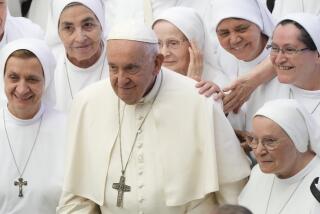S. African Cleric Urges a New Economic Ethic
- Share via
Archbishop Njongonkulu Ndungane of South Africa called Friday for a fundamental reappraisal of the world economy, warning that unless “a caring ethic” replaces greed, imbalances between the rich and the poor will threaten all.
Speaking to a luncheon of the Los Angeles World Affairs Council, Ndungane--who succeeded Nobel laureate Desmond Tutu in 1996 as Anglican archbishop of Capetown--said the time has come to put the needs of people ahead of profits.
“If the rich and the powerful do not take action, they, with the rest of the world, will suffer,” Ndungane said.
Ndungane’s appeals are the latest in a yearlong drive by Anglican, Catholic, Jewish and Protestant spiritual leaders around the world to bring moral influence to bear on issues that have traditionally been the purview of economists, bankers, big business and politicians.
About 800 million people go hungry every day and many more are malnourished, Ndungane said. The number of underweight children under 5 is expected to grow to 200 million from the current 193 million in 20 years, most of them in his native Africa. A study by the World Bank found that half the world’s population lives on less than $2 a day.
Further, he said 8 million children die each year of diseases linked to impure water and air pollution, 50 million children are mentally and physically handicapped due to poor nutrition, and 130 million children, 80% of them girls, are denied educational opportunity.
At the same time, 20% of the world’s population enjoys 80% of the world’s wealth, and the assets of the world’s top three billionaires exceed the combined gross national product of all the least developed countries--a population of 600 million people, Ndungane said.
“This state of affairs poses a threat to the survival of humanity and therefore should not be allowed to continue unabated,” he said.
Turning to the developing world’s $2.3-trillion debt, Ndungane said cries for help are being heard.
The Clinton administration has proposed $800 million in debt relief over the next five years, but President Clinton requested only $210 million for 2000, and Congress has approved none, Ndungane said.
Of $100 billion in debt relief that rich nations pledged at an international meeting in Cologne, Germany, less than $11 billion has been allocated so far.
International lending law should have a mechanism such as the bankruptcy relief allowed by domestic lending law. At the moment, he said, debtor countries have no such relief. “Unpayable debt is unpayable debt,” he said.
Paraphrasing Pope John Paul II, Ndungane said, “The law of profit alone will not help the majority of the world to come out of the deep well of poverty into which they have been plunged by a ruthless economic system whose main driving force is greed.”
More to Read
Sign up for Essential California
The most important California stories and recommendations in your inbox every morning.
You may occasionally receive promotional content from the Los Angeles Times.













